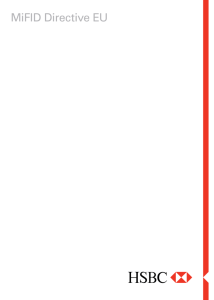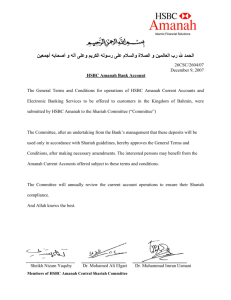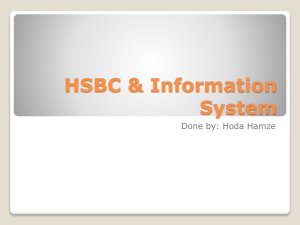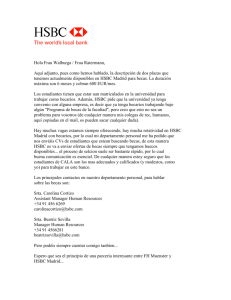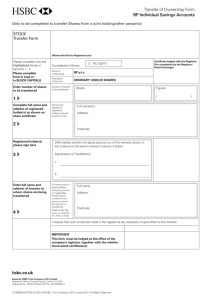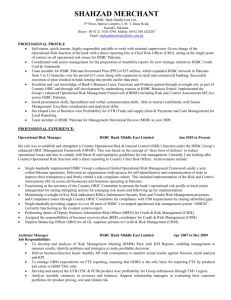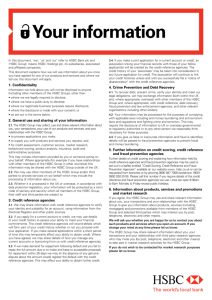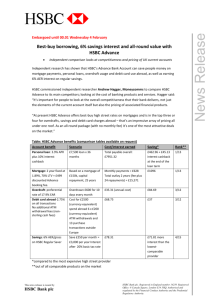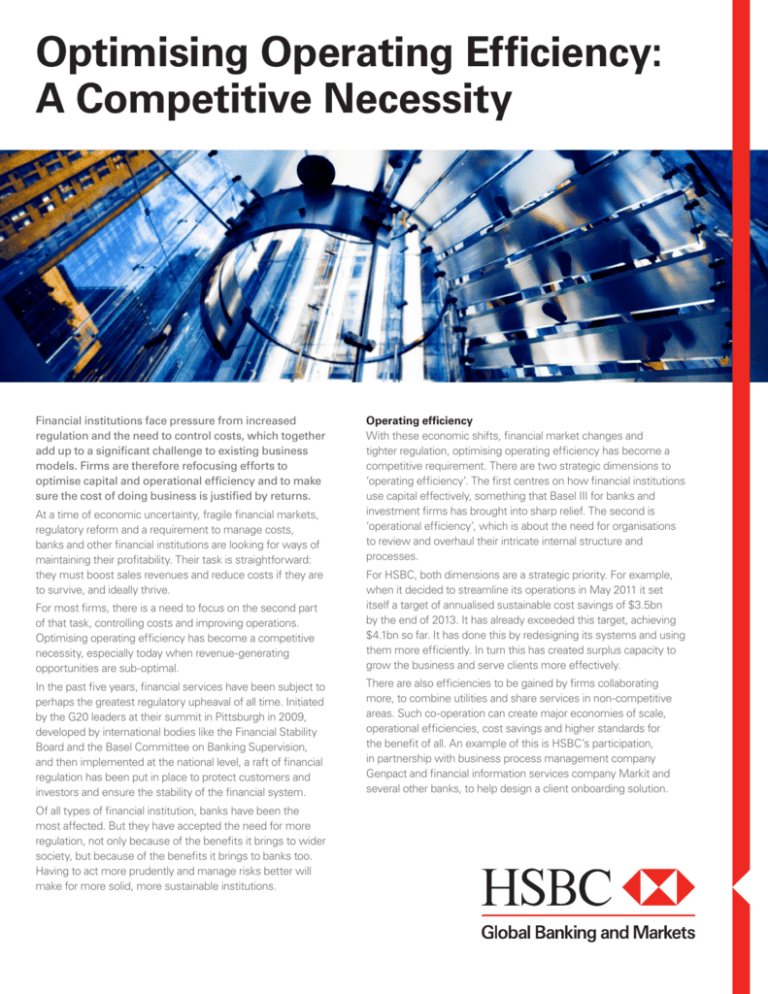
Optimising Operating Efficiency:
A Competitive Necessity
Financial institutions face pressure from increased
regulation and the need to control costs, which together
add up to a significant challenge to existing business
models. Firms are therefore refocusing efforts to
optimise capital and operational efficiency and to make
sure the cost of doing business is justified by returns.
At a time of economic uncertainty, fragile financial markets,
regulatory reform and a requirement to manage costs,
banks and other financial institutions are looking for ways of
maintaining their profitability. Their task is straightforward:
they must boost sales revenues and reduce costs if they are
to survive, and ideally thrive.
Operating efficiency
With these economic shifts, financial market changes and
tighter regulation, optimising operating efficiency has become a
competitive requirement. There are two strategic dimensions to
‘operating efficiency’. The first centres on how financial institutions
use capital effectively, something that Basel III for banks and
investment firms has brought into sharp relief. The second is
‘operational efficiency’, which is about the need for organisations
to review and overhaul their intricate internal structure and
processes.
For most firms, there is a need to focus on the second part
of that task, controlling costs and improving operations.
Optimising operating efficiency has become a competitive
necessity, especially today when revenue-generating
opportunities are sub-optimal.
For HSBC, both dimensions are a strategic priority. For example,
when it decided to streamline its operations in May 2011 it set
itself a target of annualised sustainable cost savings of $3.5bn
by the end of 2013. It has already exceeded this target, achieving
$4.1bn so far. It has done this by redesigning its systems and using
them more efficiently. In turn this has created surplus capacity to
grow the business and serve clients more effectively.
In the past five years, financial services have been subject to
perhaps the greatest regulatory upheaval of all time. Initiated
by the G20 leaders at their summit in Pittsburgh in 2009,
developed by international bodies like the Financial Stability
Board and the Basel Committee on Banking Supervision,
and then implemented at the national level, a raft of financial
regulation has been put in place to protect customers and
investors and ensure the stability of the financial system.
There are also efficiencies to be gained by firms collaborating
more, to combine utilities and share services in non-competitive
areas. Such co-operation can create major economies of scale,
operational efficiencies, cost savings and higher standards for
the benefit of all. An example of this is HSBC’s participation,
in partnership with business process management company
Genpact and financial information services company Markit and
several other banks, to help design a client onboarding solution.
Of all types of financial institution, banks have been the
most affected. But they have accepted the need for more
regulation, not only because of the benefits it brings to wider
society, but because of the benefits it brings to banks too.
Having to act more prudently and manage risks better will
make for more solid, more sustainable institutions.
The solution, announced in September, will provide banks,
asset managers and other firms with all the services and
processes they need for taking on new clients. Operating to
HSBC’s Global Standards on conduct and compliance, it will
deliver real value and consistency to users by ensuring they
comply with all their regulatory know-your-customer (KYC)
requirements.
Managing technology
Some of the biggest savings are to be made by integrating
and modernising technology. Where banks have grown
by acquisition, maintaining disparate IT systems can be
particularly expensive. It is important, therefore, that they are
integrated as quickly as possible. Banks that are disciplined
and integrate their systems early on do well. Those that are
less disciplined and continue to rely on legacy technology
face problems.
Of course, the pace of technological change is also creating
huge opportunities for banks. It is allowing them to reduce
costs structurally by embracing trends such as commoditised
hardware, open source software and cloud computing,
especially public cloud.
Outsourcing services
An important way of improving operational efficiency is to
outsource processes to a third party – an outsourced service
provider – that specialises in those processes and handles
them on such a scale as to generate major cost efficiencies.
HSBC Securities Services (HSS) is a provider of outsourced
post-trade securities transactions processing to asset
managers, pension funds, insurance companies, banks,
broker-dealers, sovereign wealth funds (SWF) and companies
around the world.
Broker-dealers have, by and large, continued to keep these
processes in house, but that is beginning to change. “2012
was a tricky year for most broker-dealers because their
income is commission based, and transaction revenues
were lower last year,” says Cian Burke, Head of Prime
Services, HSBC, and Co-Head of HSBC Securities Services.
“Their revenues are shrinking and their costs are fixed and
high. Most of these businesses run at cost-income ratios of
70-80%.”
“We are now, therefore, having conversations with brokerdealers about the benefits of outsourcing their post-trade
processing to us. They already clear and settle through our
network, so we are talking to them about how they might
move up the value chain and outsource their back or
middle office.”
This would allow broker-dealers to focus on their core
competencies and convert their fixed operational costs to a
variable cost. That would give them more certainty on their
profitability, as their variable income would be matched to their
variable costs.
Outsourcing helps broker-dealers redefine their operating
models as well as reduce costs. Even the larger ones that do not
outsource because they have scale in their processing will be
forced to redefine their processes to compete at a time when
margins are compressing.
Outsourcing – issues to consider
Whatever type of organisation you are – broker-dealer, asset
manager, pension fund, SWF – you need to monitor your
outsourcing partner closely. Tight service level agreements, allied
with regular site visits, are imperative.
What regulators think about an outsourcing arrangement is
also important. They have an interest in what regulated firms
outsource. One of their main concerns is to ensure the security
of customer data, especially when it is transferred between
organisations.
Deciding what is not a core competency so it can be outsourced
is not always a straightforward task. In addition, there is often
internal resistance by staff, who may be worried about their jobs.
Benchmarking one’s capabilities against industry standards will
highlight where one’s weaknesses and strengths lie. To address a
particular operation’s weaknesses you then have a choice: either
improve it and keep it in-house, or outsource it.
However, an outsourcing decision should be based less on what
a firm is good or bad at, and more on what is core and non-core.
As Mr Burke says: “Asset managers are good at all aspects of
managing money, whether it is investing or carrying out post-trade
processing. But processing is not their core business, which is
why they tend to outsource it to a firm that can do it as well, or
even better, and at a lower cost.”
Reviewing the operating model
The single biggest factor a firm needs to think about, therefore,
when optimising its operational efficiency is its operating model.
Achieving efficiencies is not just about generating cost savings at
the margins, it is about reassessing the operating model to bring
about a fundamental change in the way a firm operates.
The firm needs to examine what is core to its competencies and
capabilities and create an end-to-end operating model. It can then
lift out the non-core elements of that model and place them with
an outsourced service provider that has the scale and expertise to
perform them more efficiently. Taking that approach will enable a
firm to bring about a major reduction in its underlying cost base.
© 2013 HSBC Bank USA, N.A. All rights reserved. Member FDIC.
This document is provided by HSBC Bank plc (‘HSBC’). HSBC is authorised by the Prudential Regulation Authority (“PRA”) and regulated by the Financial Conduct
Authority (“FCA”) and the Prudential Regulation Authority and is a member of the HSBC Group of companies. The information contained in this document is of a general
nature only. It is not meant to be comprehensive and does not constitute financial, legal, tax or other professional advice. You should not act upon the information
contained in this document without obtaining your own independent professional advice. Information contained in this document may be obtained from sources HSBC
believes to be reliable but which have not been independently verified. Opinions and estimates expressed are our present opinions only and may change at any time
without notice. Under no circumstances will HSBC be liable for (i) the accuracy or sufficiency of this document or of any information, statement, assumption or projection
herein or any other written or oral information provided in connection therewith, or (ii) any loss or damage (whether direct, indirect, consequential or other) arising out of
reliance upon this document or any opinion or statement made in this document. All efforts have been made to ensure that the information contained herein is current
at the first date of publication. HSBC does not undertake, and is under no obligation, to provide any additional information, to update this document, to correct any
inaccuracies or to remedy any errors or omissions herein. No part of this document may be reproduced, stored in a retrieval system or transmitted in any form or by any
means, electronic, mechanical, photocopying, recording or otherwise, without the prior written permission of HSBC.




